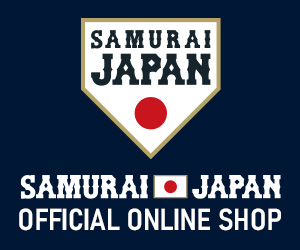Information
Talk show on the 30th anniversary of winning the gold medal at the Los Angeles Olympics
8/7/2014![]()
On the 7th, a talk show, "Baseball & the Olympics", was held in the Hall of Fame Gallery at the Baseball Hall of Fame and Museum to celebrate the 30th anniversary of winning the gold medal in baseball at the Los Angeles Summer Olympics.
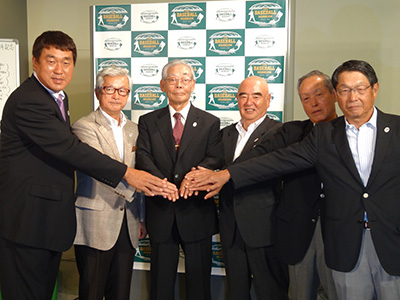
At the 1984 Los Angeles Olympics where baseball was played as a demonstration sport, Team Japan led by manager Reiichi Matsunaga beat the host team, Team USA to win the gold medal. It has been exactly 30 years today, on August 7 since the final game was played. The panelists invited to this event were the managers of Team Japan, Reiichi Matsunaga (2007 Hall of Famer), Los Angeles; Yoshinobu Suzuki, Seoul; Masatake Yamanaka, Barcelona; Katsuji Kawashima, Atlanta; Kozo Otagaki, Sydney, and Katsumi Hirosawa, a big gun, who hit a three-run shot in the final against Team USA at the Los Angeles Olympics. They shared their untold stories about the Olympic baseball games that they participated in, and showed their enthusiasm to revive baseball at the 2020 Tokyo Olympics.
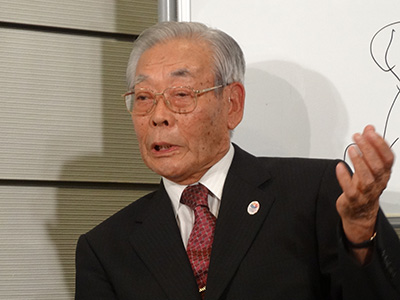
Reiichi Matsunaga
Hirosawa, who made his mark in the games at the Los Angeles Olympics, introduced Matsunaga and Suzuki. "Manager Matsunaga was very tough and demanding. We woke up in the morning, took a walk and had a meeting. Then we practiced and had another meeting. After that, we practiced again and had another meeting…three meetings a day. Coach Suzuki (manager later at the Seoul Olympics) was as tough. It reached 40℃ in Los Angeles in the summer. Manager Matsunaga and Coach Suzuki told us to hit off of batting tees for two hours under the blazing sun! I thought we were all used to practicing on scorching hot days, but I couldn't stand it when the back of our necks were so burnt that the skin came off. Yet they never let us stop! Today I've got a lot to say about them," he said jokingly. While continuing to tell his amazing stories about the hardships that the team went through, he confessed that he still keeps in mind what he learned from Matsunaga and practices it.
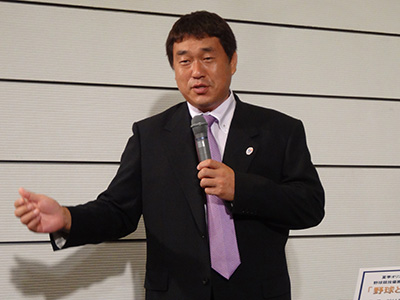
Katsumi Hirosawa
"Dodger Stadium, where we had the final against Team USA, was packed. People sang the Star-Spangled Banner out loud together. We knew Team USA was very good and they looked so relaxed that day. We, on the other hand, were so tense. I got cold feet. Then Manager Matsunaga called us together and said, 'Being relaxed doesn't always help you play well. Just do your best. There are a lot of things you can achieve only when you are tense.' He made me think it's OK to be nervous. I felt relieved. Today people often ask me, 'What can I do when I feel overwhelmed with pressure?' I borrow Manager Matsunaga's words and say, 'It's OK to feel pressured and get nervous. There are things you can do only when you are tense. There's nothing wrong with being nervous. It's not your enemy.' I believe that Manager Matsunaga's words led us to the victory over Team USA," Hirosawa said and smiled.
Hirosawa's heartwarming story was followed by the other panelists' stories about their games in the Olympics.
Yoshinobu Suzuki (manager at the Seoul Olympics/vice president of Baseball Federation of Japan)
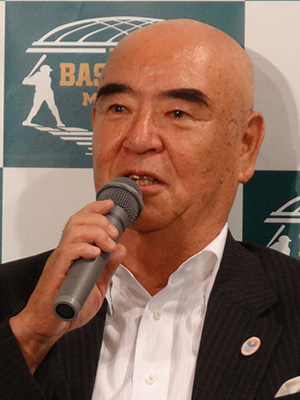
Yoshinobu Suzuki
"Although our team was expected to be 30% better than the one at the Los Angeles Olympics, we lost to Team USA in the final. Jim Abbott, the pitcher, who was born with no right hand, came to me before the game started and said, 'I'm here with two purposes. One is to avenge our loss to you guys at the Los Angeles Olympics. The other is to win the gold medal and give hope to many other athletes that have conditions much more serious than mine.' In the final, being unable to catch a line drive with his glove, instead of dodging the ball, he blocked it with his chest and threw the batter out at first base. We were so moved by his action that we gave him applause. After the game, I went to congratulate him. He said, 'I'm glad I've done what I promised to do.' I felt disappointed that my team didn't win the gold medal, but I remember telling them to learn from Jim Abbott that there's something much more important in baseball than winning the gold medal."
Masatake Yamanaka (manager at the Barcelona Olympics/specially-appointed professor of Hosei University)
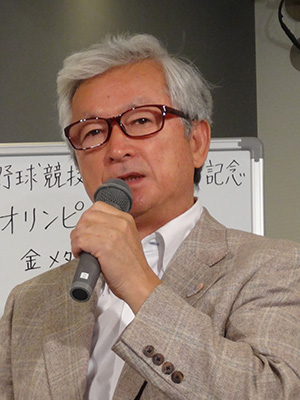
Masatake Yamanaka
"Expectation toward an interest in Team Japan grew in Japan when baseball became an official Olympic sport at the Barcelona Olympics. Many people thought Team Cuba, who participated in the Olympics for the first time, were gold diggers, but I felt people were expecting us to win the silver, at least. However, we were defeated by Chinese Taipei at the semifinal by 1 to 2. On the bus home, everyone was so disappointed and angry with the defeat that nobody said a word. People said that we overestimated ourselves or we neglected to do enough research on our opponents. We managed to defeat Team USA in the third-place play-off, but I have to say that we weren't able to bat the way we wanted to at the Barcelona Olympics after all. Hirosawa's mentioning earlier that he and his team were told to practice batting for a long time under the sun for the Los Angeles Olympics reminded me of something. One day in the Olympic Village, Mr. Kaminaga (Akio Kaminaga: manager of the Japanese Judo Team at the Barcelona Olympics) looked at somebody and asked me, 'Who is that?' It was Kokubo. (Hiroki Kokubo: student of Aoyama Gakuin University at that time). He was the only college student that had been selected to play in the Barcelona Olympics. Mr. Kaminaga said, 'He practices batting in that dark corner at the same time every single night. This kind of untiring effort is what you need to achieve something great and become a top baseball player.' Mr. Kaminaga knew what it takes to be the best of the bests. The Olympic Village was filled with athletes' pride. They were proud to have been chosen to represent their countries and compete against the world's best athletes. They were proud of their spirits of challenge and friendship with other great athletes from all over the world. I really hope that baseball will be back in the 2020 Tokyo Olympics and thereafter so that younger generations who play baseball will have a wonderful experience like we did."
Katsuji Kawashima (manager at the Atlanta Olympics/former vice president of Japan Amateur Baseball Association)
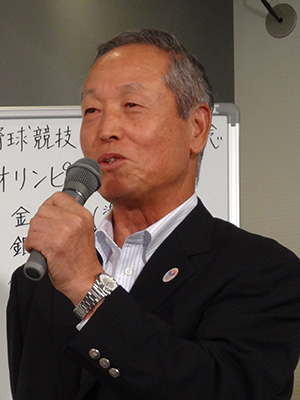
Katsuji Kawashima
"We played at the Atlanta Braves' home stadium, which can hold over 50,000 people. When the States, Japan and Cuba played, 45,000 to 47,000 people were expected to come to watch the games. It's gonna be very exciting. We're gonna have a lot of fun. I love the Olympics, I thought. However, in reality, there were quite a few unwanted incidents, like the bus to the stadium didn't come as scheduled and we were forced to start a game one hour late, or the fire alarm went off in the middle of the night where we were staying. I realized how tough it was to stay calm and show your abilities to the fullest under any circumstance. It takes a lot to win medals, not only skills and physical strength, but also mental and emotional strength. We played against Team Cuba in the final. The starting pitcher, Sugiura (Masanori Sugiura: Nippon Life Insurance Company) let them get 6 runs in the second inning, but then Matsunaka (Nobuhiko Matsunaka: Nippon Steel Corporation Kimitsu Works at that time) hit a grand slam to tie the game. Later he said that he had to do it at any cost for Sugiura as well as for the team. We lost to Team Cuba in the end, but we won the thunderous applause from a large audience of 42,000. A volunteer said, 'Hey, everybody's waiting for your victory lap. You deserve it.' I still remember that Team Japan made the circuit of the stadium in tears with a Japanese flag. The silver medal we won that day was as priceless as the gold."
Kozo Otagaki (manager at the Sydney Olympics/managing director of Baseball Federation of Japan)
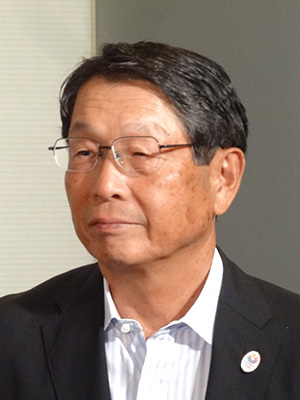
Kozo Otagaki
"In 1998, pro players were allowed to join the team for the first time. Eight players joined in the 2000 Sydney Olympics, one from each team in the Pacific League but only two altogether from the Central League. I got the impression that professional baseball didn't have much interest in the Olympics. Unfortunately, we wound up in 4th place, but when we were defeated in the third-place play-off, I was very much touched to see the professional players shedding tears of disappointment with their amateur fellow players at the bench and in the locker room because until that time I kind of thought they were not very enthusiastic about winning in the Olympics. Then I felt sorry that I couldn't make the most of their skills and talents in the games. The wall between pro and non-pro baseball is getting lower and lower now. I hope that we bring baseball back to the 2020 Tokyo Olympics in order to make this wall even lower for younger generations to become more and more interested in baseball in the future."
Matsunaga closed the talk show by saying, "Today 108 countries are members of the International Baseball Federation. We must not forget all the painstaking efforts and contributions that people have made for baseball to have developed into a worldwide sport. We, who once led Team Japan in the Olympics, will work together in order to realize our nation's dream to bring baseball back to the Olympics for our younger generations."
Latest Article
 |
RAXUS SAMURAI JAPAN SERIES 2025 JAPAN vs KOREA roster announcement 10/8/2025 |
|---|
 |
2nd WBSC Youth Baseball5 World Cup 2025 roster announcement 9/7/2025 |
|---|
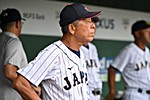 |
WBSC U-18 Baseball World Cup 2025 presented by RAXUS roster announcement 8/23/2025 |
|---|
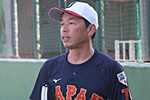 |
31st BFA Asian Championship 2025 roster announcement 8/22/2025 |
|---|
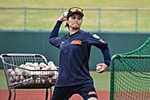 |
4th BFA Women's Baseball Asian Cup roster announcement 7/22/2025 |
|---|



